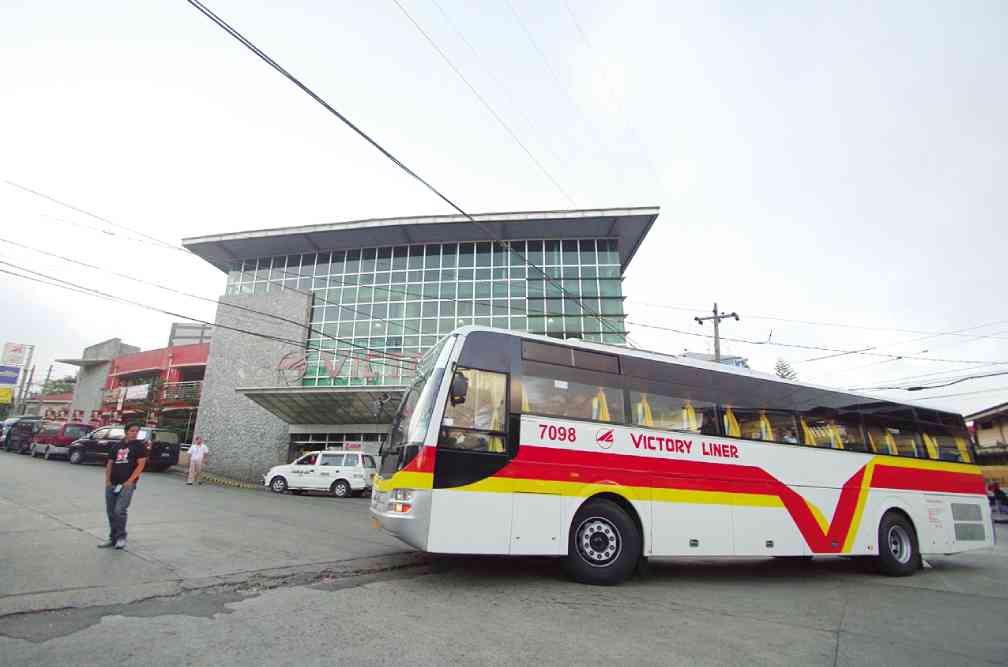Victory Liner zooms ahead at 70
CITY OF SAN FERNANDO—A six-wheel Chevy truck the United States Army used as a weapons carrier and which it abandoned at the close of World War II in the Philippines in 1945 started the fleet that Victory Liner Inc. (VLI) fielded daily in northern and Central Luzon.
This was the humble beginning of what is now regarded as the biggest bus company north of Metro Manila, says Ronald Sarmiento, VLI operations manager.
VLI celebrated another milestone on Oct. 15 when it reached its 70th year of operations.
Sarmiento, who joined VLI in 1976, says he learned of the Chevy story from older employees and the founder himself, Jose Isaac Hernandez, a mechanic from Macabebe town in Pampanga province. The VLI website tells the same story.
Hernandez, as the story goes, fixed the abandoned military truck so he and his brothers-in-law, Leonardo and Eugenio, could use it to deliver fish sauce (patis) and paste (bagoong) and rice around Metro Manila.
“Don Jose was the driver. American soldiers and civilians paid him for their rides so he added wood planks to sit more passengers,” Sarmiento says.
Hernandez stopped the trading business when it turned out that ferrying people earned him more money at a time when the public transport system had yet to recover from the war.
He then commissioned his friend, Po Chuan, to build a truck that would accommodate more passengers. Hernandez called this vehicle, “Victory,” after “Victory Joe,” the greeting that Filipinos usually gave American soldiers.
Shortly after, Hernandez bought 10 buses from Tri-V Tran, then owned by Teodoro Yangco of San Antonio town in Zambales province and which plied the Cavite and Caloocan routes from Olongapo City, Sarmiento says.
Hernandez and his wife, Marta Trinidad of Hagonoy, Bulacan, involved their children and their immediate relatives in the early years of the enterprise.
VLI is now owned and managed by second and third generations of the family and close kin, says Yvonne Zenaida Gantioqui, finance and administrative manager of VLI.
“They’re simple people who steer VLI to innovations,” she says of the current owners and managers.
VLI, which has a fleet today of 917 buses, now plies Zambales, Pangasinan, Bulacan, Pampanga, Bataan, Baguio City and the Cagayan Valley region.
Gantioqui says VLI remains confident of doing business in northern and Central Luzon, even projecting a 6 to 8 percent yearly growth.
“[T]he renewed confidence of investors in the Philippine economy … has resulted in a boom not just of consumers’ but of investors’ confidence in such places as San Fernando City in Pampanga, Baguio City in Benguet, Dagupan City in Pangasinan and, we notice, even in Clark and Subic, things are perking up,” she says.
Sarmiento says VLI moves daily 30,000 to 35,000 passengers, cornering about 50 percent of the market. “We dream to serve Clark International Airport passengers,” he also says.
Gantioqui says VLI is addressing overcapacity by retiring 15-year-old buses and replacing these with 100 new units yearly at a cost of about P550 million.
For the safety of commuters, Sarmiento says drivers are regularly trained and are required to drive within speed limits.
Gantioqui says VLI has weathered the 1990 earthquake, Mt. Pinatubo’s 1991 eruptions, floods and the 1997 financial crisis.
“It has been able to pay debts and suppliers on time, expanding also its credit lines,” she says.
The Chevy truck and the Tri-V buses that formed the initial fleet are no longer around, “[but] the values the founders left—simplicity, hard work—stay with us 2,500 employees,” Gantioqui says.

